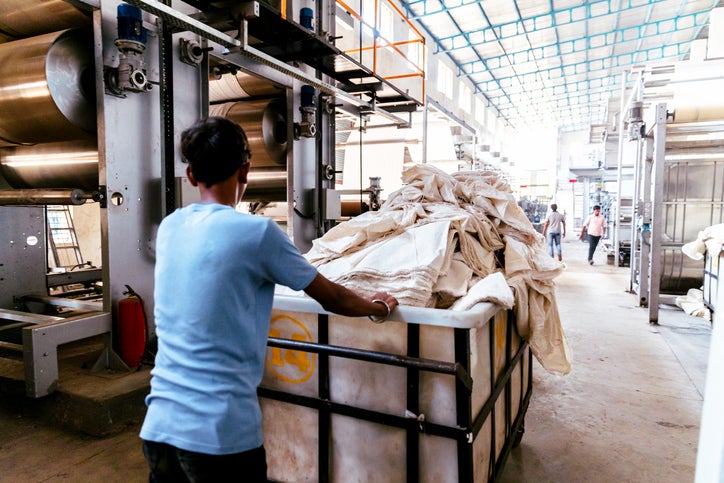
A recent Reimagining Textile Waste conference in New Delhi, India hosted by Laudes Foundation, IDH, Canopy, and Reverse Resources focused on developing the country’s roadmap to circularity by launching a next-generation solutions hub, sharing findings from the two-year Sorting for Circularity India project and releasing a toolkit designed to revalidate textile waste in India
The conference also launched the Re-START Alliance (Recover by Sourcing, Tracing, and Advancing Recycling Technologies), a textile recovery alliance established by Fashion for Good, Laudes Foundation, IDH and Canopy.
The alliance aims to scale a formal textile waste supply chain, systems, infrastructure, stronger policy intervention, and industry appetite to enable technology commercialisation and will launch officially in Q1 2024.
Canopy’s executive director Nicole Rycroft believes India is well positioned to become a global leader in low-carbon Next Gen textile production.
She said: “Canopy is thrilled to be part of this new collaboration to help India realise that potential. With India’s abundance of textile waste, innovative industry leaders, and the collective buying power of our global network of brands, together we can transform unsustainable supply chains, reduce emissions, and create economic opportunities across India.”
Sorting for Circularity India Project’s journey
Fashion for Good said the project has provided invaluable insights and it has unveiled a toolkit from it that is designed to “harness the untapped potential” of textile waste in India.
Fashion for Good believes that its resources will provide valuable insights, assessments, and practical guidance to advance recycling in India’s textile industry.
Fashion for Good’s managing director Katrin Ley said: “The Sorting for Circularity India toolkit is a milestone in our journey towards a waste-free world. We have mapped the textile waste landscape, unpacking the huge potential, as well as the roadblocks and commercial opportunities in India’s textile waste industry. We are excited to move beyond rhetoric with this powerful coalition of partners and translate our findings into a roadmap for concrete actions.”
How to use the Sorting for Circularity India toolkit
The Fashion for Good Sorting for Circularity India toolkit is described as an action plan for anyone looking to understand or exploit the opportunity in textile waste.
The Toolkit for organising textile waste in India details the project framework, insights from the pilot, study and data along with guidance on how to use the toolkit.
- For an individual or business with an interest in waste, the toolkit lays out the blueprint for setting up infrastructure for textile waste in India and provides an encompassing study of the challenges, limitations and opportunities that have emerged from the Sorting for Circularity project, and how they need to be capitalised on in order to valorise the potential of India’s textile waste
- For policy and development organisations, this toolkit is a 360-degree view on the current gaps that are currently hampering the development of a circular textile waste landscape in India. While the opportunities are vast, the toolkit helps establish areas in need of support and aims to serve as a driving force towards creating and encouraging frameworks to establish India as a leader in textile waste management and valorisation.
India’s post-consumer textile waste landscape
According to Fashion for Good’s Wealth in Waste report, every year, 1,720 KTons of 100% cotton post-consumer domestic (PCD) textile waste remains unvalorised in India due to the lack of proper collection and sorting systems.
The initiative remarked that with the upcoming surge of legislation on textile waste management, the value of post-consumer waste is expected to rise, making it crucial for India to focus on PCD waste and develop necessary infrastructure for collection, sorting, and pre-processing.
In the context of the Sorting for Circularity India Project ‘Post-consumer Pilot Program’, Fashion for Good noted that several pilots were carried out with its innovators along with assessment of the commercial viability of sorting hubs using these sorting technologies.
Fashion for Good shared the pilot worked with 33 tons of textile waste, exploring innovative sorting technologies, the nuances of post-consumer waste, and the potential for a closed-loop system in India’s textile industry.
On the other hand, the business case assessment delved into infrastructure and investment requirements, examined potential financial success scenarios, and identified roadblocks.
This served as a framework to enable well-informed decision-making for sorting hubs to implement these technologies, added Fashion for Good.
Laudes India managing director Anita Chester remarked: “This incredibly strategic collaboration between three of our partners will be a game-changer in that it brings together three critical ingredients needed to scale the adoption of next-generation fashion materials globally – textile waste as the feedstock, the market in terms of brand commitments, and sizable investments. All of which India is abundant in, making the region ripe with potential.”



